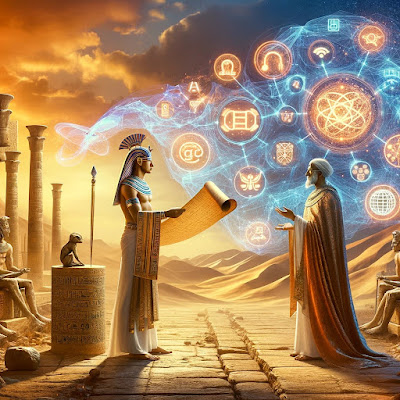In Plato's "Phaedrus," Socrates recounts the tale of Theuth, the Egyptian god of writing, presenting his invention to King Thamus. This ancient narrative, exploring the invention's impact on memory and wisdom, mirrors the last couple of decades' discourse on the emergence of the Internet, and now, Artificial Intelligence. This post's primary lens focuses on cognitive implications. There are, of course, broader concerns the digital age and AI have introduced.
Revisiting Theuth in the Age of Information and AI
Theuth's claim that writing would enhance memory and wisdom was met with skepticism by Thamus, who argued it would instead weaken memory and give only an illusion of wisdom. This cautionary perspective finds its echo in the modern era, first with the Internet, and now more profoundly with AI. Both technologies, while distinct, share a common thread in their transformative impact on how we acquire, process, and value knowledge.
The Internet: A Precursor to AI's Cognitive Challenge
Before AI became a household term, the Internet had already begun reshaping our cognitive landscapes. Dubbed as an external "hard drive" for our collective memory, it introduced the "Google effect," where the ease of accessing information led to a potential decline in memory retention and effort in learning (See Nicholas Carr's book, The Shallows). The vast, accessible sea of data promised knowledge but often delivered a surface-level engagement with complex subjects, mirroring Socrates' concerns about the written word.
AI and Beyond: A Continuation of Digital Age Dilemmas
AI amplifies these concerns, offering unparalleled access to information and automating tasks with efficiency but at the potential cost of diminishing our cognitive faculties. The ''illusion of wisdom'', where individuals may overestimate their understanding due to the breadth of accessible information, becomes an even greater risk. As AI systems take on more roles that require analysis, decision-making, and even creativity, the question of what it means to truly know or understand something becomes increasingly pertinent.
Acknowledging the Spectrum of Concerns
While I focus here on cognitive effects, I also want to recognize that the challenges posed by AI and the Internet are multifaceted. Ethical dilemmas, privacy breaches, algorithmic biases, and the digital divide are significant issues that warrant attention. The societal impact of these technologies stretches beyond individual cognitive abilities, affecting our collective moral and social frameworks.
Charting a Thoughtful Path Forward
In navigating the future of AI and the digital landscape, a balanced, thoughtful approach is essential. By critically assessing the benefits and potential pitfalls, especially in how these technologies influence human cognition, we honor the Socratic tradition of deep questioning. This not only involves scrutinizing AI's capabilities and impacts but also reflecting on how the Internet has set the stage for today's digital challenges.
As we continue to integrate AI and digital technologies into our lives, let's maintain a critical eye towards their impact on our cognitive abilities and society. The story of Theuth, extending through the age of the Internet to the dawn of AI, serves as a valuable framework for understanding these challenges, encouraging us to ensure that technology enhances, rather than diminishes, our human experience.
----
I used AI to research and write this post. To what extent did that contribute to a potential decline of my cognitive capabilities -- regardless of inevitable age-related decline? To what extent did it enhance my knowledge, understanding, and cognitive capabilities? How would I know? What can I do to prevent cognitive decline related to technology use (or overuse) while leveraging technology to enhance my access to and use of knowledge?
